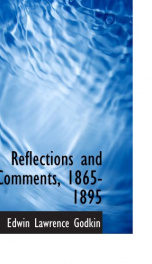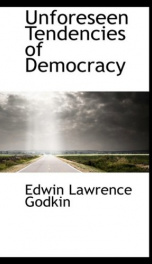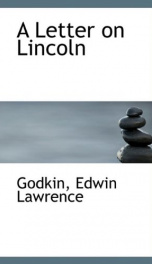Godkin Edwin Lawrence

Edwin Lawrence Godkin (October 2, 1831-May 21, 1902) was an American journalist and newspaper editor, and founder of The Nation. He was born in Moyne, county Wicklow, Ireland. His father, James Godkin, was a Congregationalist minister and a journalist, and the son, after graduating in 1851 at Queen's College, Belfast, and studying law in London, was in 1853-1855 war correspondent for the London Daily News in Turkey and Russia, being present at the capture of Sevastopol, and late in 1856 went to America and wrote letters to the same journal, giving his impressions of a tour of the southern states of the American Union. He studied law in New York City, was admitted to the bar in 1859, travelled in Europe in 1860-1862, wrote for the London News and the New York Times in 1862-1865, and in 1865 founded in New York City The Nation, a weekly projected by him long before, for which Charles Eliot Norton gained friends in Boston and James Miller McKim in Philadelphia, and which Godkin edited until the end of the year 1899. In 1881 he sold the Nation to the New York Evening Post, and became an associate editor of the Post, of which he was editor-in-chief in 1883-1899, succeeding Carl Schurz. In the eighties he engaged in a controversy with Goldwin Smith over the Irish question. Under his leadership the Post broke with the Republican Party in the presidential campaign of 1884, when Godkin's opposition to nominee James G. Blaine did much to create the so-called Mugwump party, and his organ became thoroughly independent, as was seen when it attacked the Venezuelan policy of President Grover Cleveland, who had in so many ways approximated the ideal of the Post and Nation. He consistently advocated currency reform, the gold standard, a tariff for revenue only, and civil service reform, rendering the greatest aid to the last cause. His attacks on Tammany Hall were so frequent and so virulent that in 1894 he was sued for libel because of biographical sketches of certain leaders in that organization; cases which never came up for trial. In 1896, Godkin broke with the Democratic party after it nominated William Jennings Bryan. He supported the National Democratic Party (United States) third ticket because it championed a gold standard, limited government, and opposed protectionism. His opposition to the war with Spain and to imperialism was able and forcible. He retired from his editorial duties on the December 30, 1899, and sketched his career in the Evening Post of that date. Although he recovered from a severe apoplectic stroke early in 1900, his health was shattered, and he died in Greenway, Devon, England, on the May 21, 1902. Godkin shaped the lofty and independent policy of the Post and The Nation, which had a small but influential and intellectual class of readers. But as editor he had none of the personal magnetism of Greeley, for instance, and his superiority to the influence of popular feeling made Charles Dudley Warner style the Nation the weekly judgment day. He was an economist of the school of Mill, urged the necessity of the abstraction called economic man, and insisted that socialism put in practice would not improve social and economic conditions in general. In politics he was an enemy of sentimentalism and loose theories in government. He published A History of Hungary, A.D. 300-1850 (1856), Government (1871, in the American Science Series), Reflections and Comments (1895), Problems of Modern Democracy (1896) and Unforeseen Tendencies of Democracy (1898).
do you like this author?
What readers are saying
What do you think? Write your own comment on this book!
write a commentWhat readers are saying
What do you think? Write your own comment on this author!
write a commentBook list

life and letters of edwin lawrence godkin volume 02
Series:
Unknown
Year:
Unknown
Raiting:
4/5
Show more
add to favoritesadd In favorites
Book list

life and letters of edwin lawrence godkin volume 02
Series:
Unknown
Year:
Unknown
Raiting:
4/5
Show more
add to favoritesadd In favorites

life and letters of edwin lawrence godkin volume 01
Series:
Unknown
Year:
Unknown
Raiting:
3/5
Show more
add to favoritesadd In favorites

henry g pearson a memorial address delivered june 21 1894
Series:
Unknown
Year:
Unknown
Raiting:
3.5/5
Show more
add to favoritesadd In favorites

Reflections and Comments 1865-1895
Series:
Unknown
Year:
Unknown
Raiting:
4.5/5
Designed for school districts, educators, and students seeking to maximize performance on standardized tests, Webster's paperbacks take advantage of the fact that classics are frequently assigned readings in English courses. By using a running thesaurus at the bottom of each page, this edition of Reflections and Comments 1865-1895 by Edwin Lawrence Godkin was edited for students who are actively building their vocabularies in anticipation of taking PSAT¿, SAT¿, AP¿ (Advanced Placement¿), GRE¿, LSAT¿, GMAT¿ or similar examinations.PSAT¿ is a registered trademark of the College Entrance Examination Board and the National Merit Scholarship Corporation neither of which sponsors or endorses this book; SAT¿ is a registered trademark of the College Board which neither sponsors nor endorses this book; GRE¿, AP¿ and Advanced Placement¿ are registered trademarks of the Educational Testing Service which neither sponsors nor endorses this book, GMAT¿ is a registered trademark of the Graduate Management Admissions Council which is neither affiliated with this book nor endorses this book, LSAT¿ is a registered trademark of the Law School Admissions Council which neither sponsors nor endorses this product. All rights reserved.
Show more
add to favoritesadd In favorites
What readers are saying
What do you think? Write your own comment on this author!
write a commentif you like Godkin Edwin Lawrence try:
readers also enjoyed
What readers are saying
What do you think? Write your own comment on this author!
write a commentGenre
if you like Godkin Edwin Lawrence try:
readers also enjoyed
Do you want to read a book that interests you? It’s EASY!
Create an account and send a request for reading to other users on the Webpage of the book!



